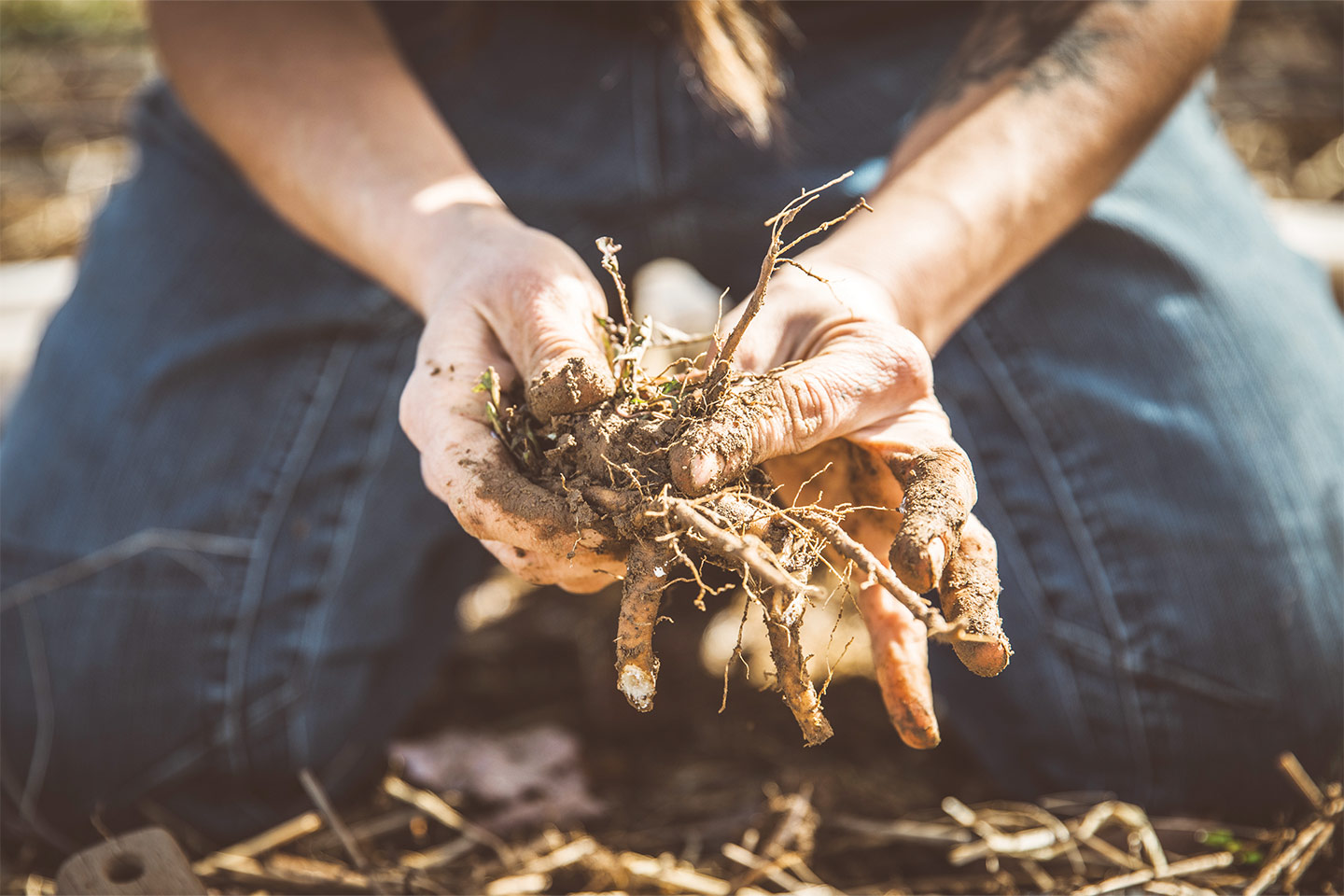
14 minute read
Hardworking Homesteaders
Hardworking Homesteaders
By Gray Bennett
With a focus on reconnecting to nature and increasing self-sufficiency, homesteaders lead a unique lifestyle in the modern world. More than just a friendly face at your local farmer’s market, these individuals work hard every day to live off the land and provide for their communities. Read on to learn more about six local homesteaders and the incredible lives they lead.
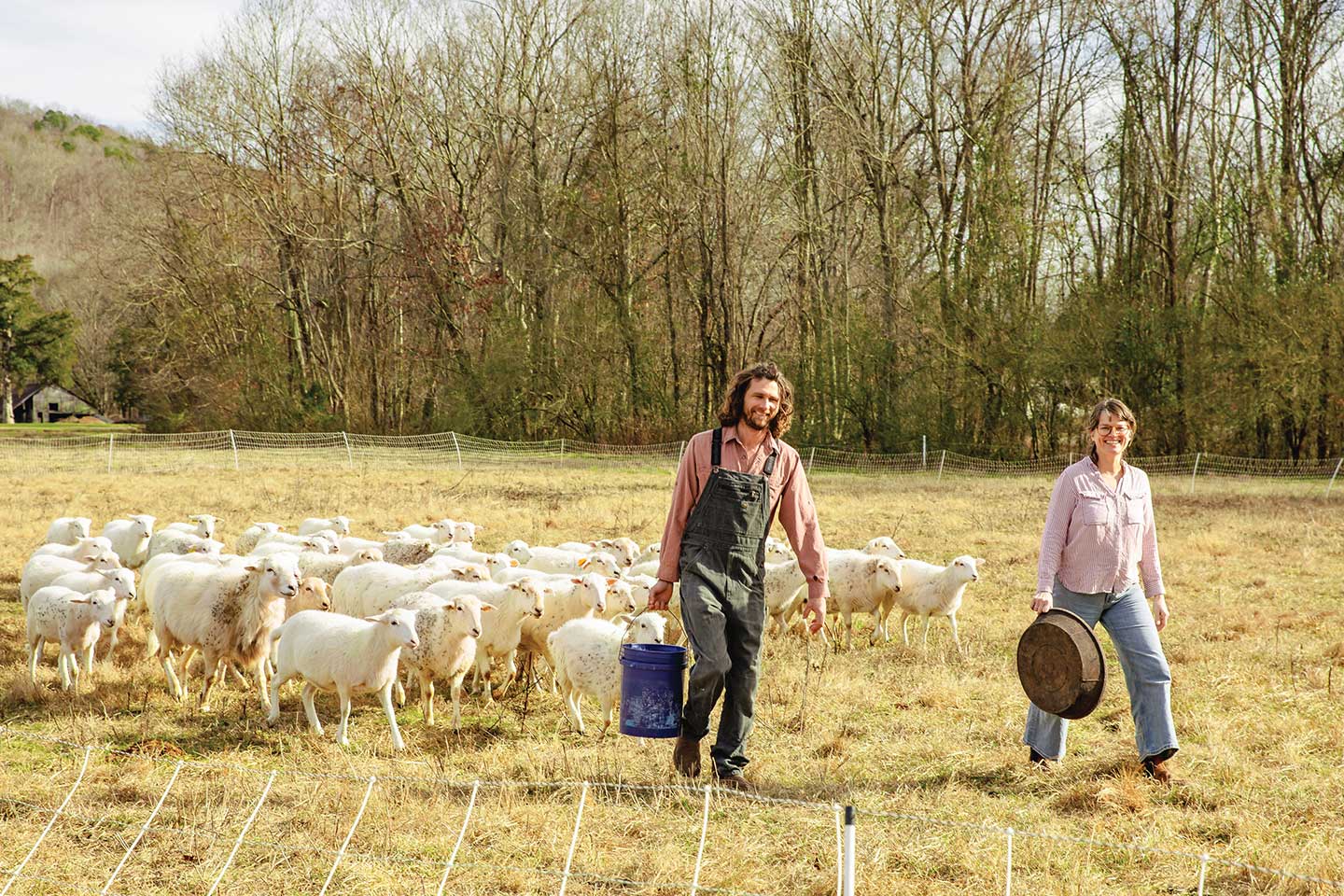
Kelsey Keener | Sequatchie Cove Farm
For Kelsey Keener, homesteading means continuing the legacy of his family’s multigenerational farm. Sequatchie Cove Farm is home to four generations of Keener’s family, and they have been farming together for over 30 years. “Living and working on a multigenerational farm has its challenges, but overall it’s an amazing experience for all of us,” Keener shares. “I have grown up here, and my wife Ashley and I built a house and started our own family here about 12 years ago.”
On a 300-acre property with about 100 acres of farmable land, Sequatchie Cove is a diversified farm, yielding pasture-raised eggs and meats as well as organic vegetables and grains. Animals on the farm include chickens, cows, pigs, sheep, and goats, as well as a few Great Pyrenees guard dogs and one adorable guard donkey. All the animals roam free outdoors, enjoying fresh grass and quality care. When it comes to fresh produce, the farm utilizes organic and biodynamic farming practices and offers a wide seasonal variety, including beautiful corn, tomatoes, okra, beans, berries, and more.
A typical day for Keener is full of maintenance projects and farm chores. After helping his kids get ready for homeschool pro-
grams in the morning, Keener heads outside to tend to the animals. He feeds and waters the chickens, gathers and packs eggs, and moves the sheep to new pasture. With the animals taken care of, he continues his day with more work outdoors. From cutting firewood and repairing fences to plumbing projects and building improvements, a variety of hands-on jobs ensure everything on the farm runs efficiently.
Those looking to get involved have no shortage of options. Sequatchie Cove invites the surrounding community to experience the farm’s bounty through farmer’s markets, local grocery stores, volunteer opportunities, and various events and classes hosted on the farm. With an overall goal to provide future generations with a better world to live in, the farm is always finding new ways to increase sustainability and provide abundance for others to enjoy.
Keener encourages aspiring homesteaders to embrace the work as a gift. “Do your research, pick the right property, be patient, and be prepared for lots and lots of hard work,” he says. “We have always been drawn to a simple life connected to the land and living in harmony with nature. We hope to pass the farm on to the next generation and keep our way of life alive into the future!”
_____
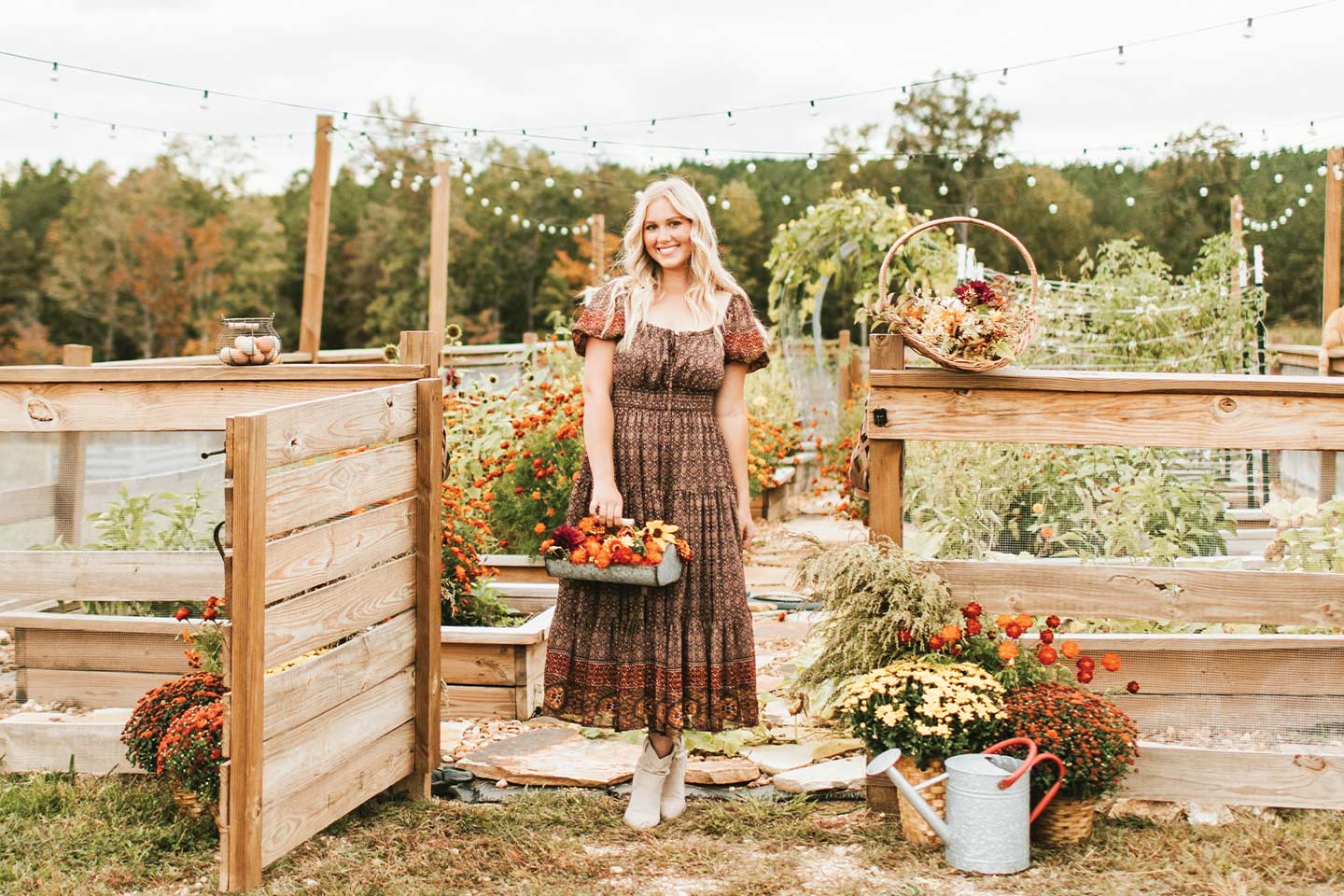
Lauren Matts | Sunny Hill Farm
Established in 2022, Sunny Hill Farm sprouted from Lauren and Chris Matts’ desire for intentional, country living. “We felt an ever-growing yearning to get back to our roots, quite literally,” Lauren Matts says. “At first, the craving started with a little porch garden in pots, and then we planted a few raised beds in our little backyard in the middle of the city … but we wanted more.” Now, with 37 acres, beautiful garden spaces, 15 goats, four donkeys, 20 chickens, and six farm cats, the Matts’ passion for homesteading has become a flourishing lifestyle.
The garden is where it all started - their own “little Garden of Eden.” Ready to put their gardening gloves to the test, the Matts took on the challenge of building their dream greenhouse and garden area. Soon, tomatoes, cucumbers, leafy greens, and herbs filled the kitchen on their sunny hilltop homestead. Matts notes how, beyond fresh produce, gardening offers a host of opportunities for learning and personal growth. “There’s an unmatchable joy in sowing a seed, nurturing it, and watching it thrive,” she explains. “Gardening teaches patience, resilience, and a deeper understanding of the balance of nature.”
In addition to maintaing thriving gardens, other important aspects of Matts’ homesteading lifestyle include animal care, home improvement, and cooking. Whether it’s prepping the chicken coop for winter or ensuring proper nutrition for the goats, Matts ensures her animals receive loving attention and care. Matts’ home improvement projects include various DIY décor renovations as well as beautifully styled tablescapes. She adds another layer of intentionality with her love for scratch-made meals and healthier eating habits.
Today, the farm has expanded in new ways for others to enjoy. Using regenerative and organic farming practices, the Matts grow and sell seasonal produce at local farmer’s markets. They also have a Community Supported Agriculture (CSA) program that provides weekly deliveries of fresh seasonal produce. For those looking to get involved with the garden, volunteer days are hosted several times throughout the year.
From sustainable farming practices to home-cooked meals, life at Sunny Hill Farm is all about slowing down and reconnecting with nature through gratitude and mindfulness. “While the city will always hold a special place in my heart, the call of the country, with its many blessings, now resonates deeper,” says Matts. “There is no such thing as a perfect homesteader. You learn from your mistakes along the way and enjoy the journey!”
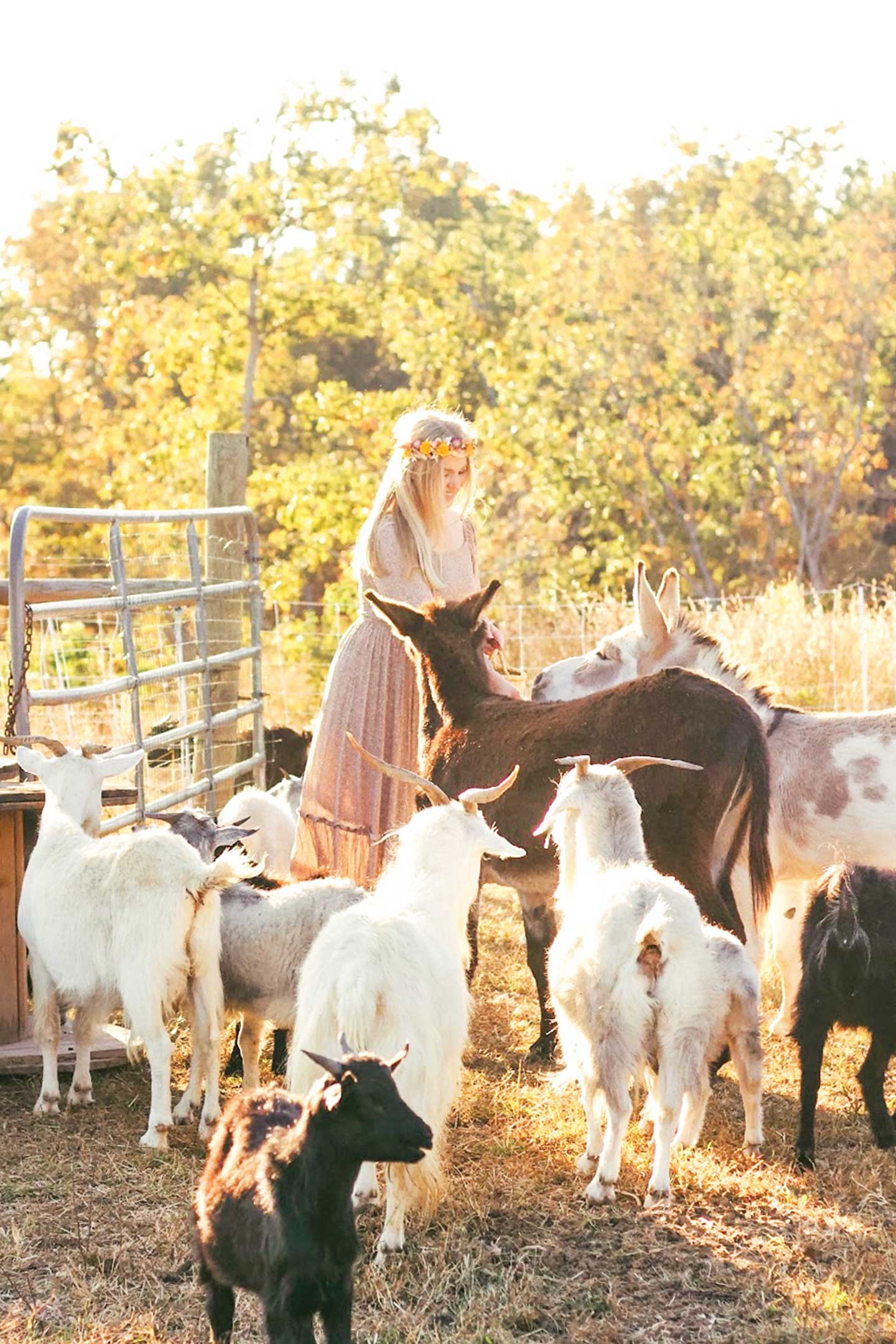
There’s an unmatchable joy in sowing a seed, nurturing it, and watching it thrive. Gardening teaches patience, resilience, and a deeper understanding of the balance of nature.
_____
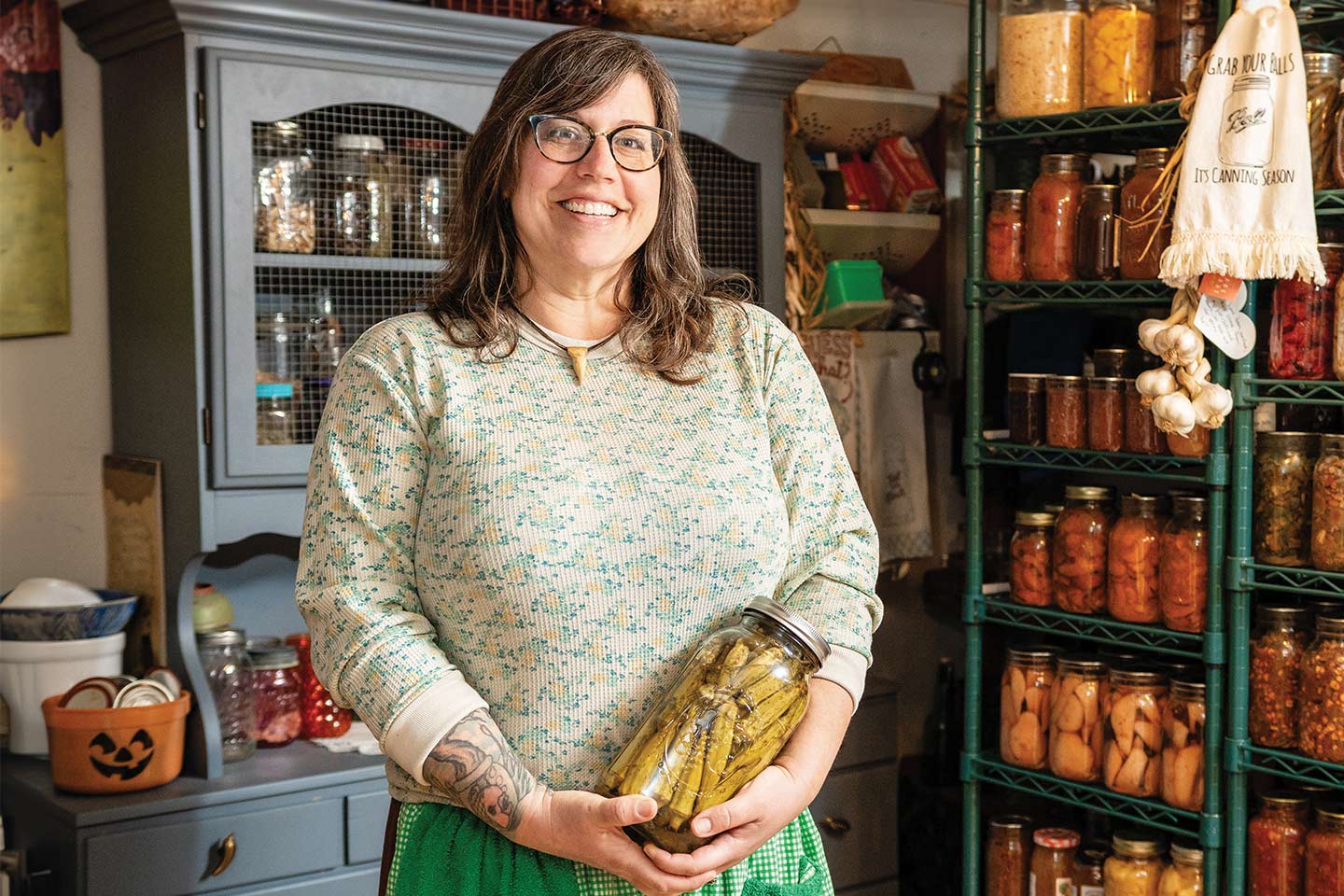
Jessie Gantt-Temple | Feathers & Fruit
After meeting her husband Robert in the Carolinas and moving to Chattanooga, Jessie Gantt-Temple - former radio DJ, journalist, and roller derby skater - decided her next adventure would be farming. She volunteered at a local community farm for five years, and in 2016, she found acreage online that would soon become Feathers & Fruit. “We spent the first few years working the fallow land with goats,” Gantt-Temple explains. “Once the pastures were walkable, we connected with a couple of local restaurants and acquired a few hundred chickens. It’s been a funny farm scenario ever since.”
On 19 acres in Soddy-Daisy, Feathers & Fruit focuses on feathered animals, fresh orchard produce, and a variety of canned goods. In addition to moving her mobile chicken coop to fresh pasture each month, Gantt-Temple’s daily chores include feeding and watering, collecting eggs, and replacing straw. Regarding the orchard, she prunes and mulches in the winter, adds soils amendments in the spring and fall, and harvests in the summer. The farm yields pasture-raised poultry as well as delicious blueberries, blackberries, strawberries, and figs. At least once a week, she pickles produce, makes marmalade, or preserves meat and other meals.
Through her many farming adventures, Gantt-Temple shares that it’s often the less glamorous moments that are the most teachable. In one instance, she dealt with two unruly roosters who taught her to laugh while facing challenges. “I had two roosters who tried to establish the pecking order with me,” she says. “The roosters came at me like a pair of velociraptors, and I waved my arms like one of those inflatables, stomping and yelling to establish dominance. I ended up stumbling into a hole and face-planted! Robert was watching from a distance, laughing his head off. I couldn’t help but laugh too.”
In addition to selling produce and eggs at local farmer’s markets, Gantt-Temple shares her passion for homesteading by hosting a variety of unique events at the farm. From fitness events to basic pistol safety classes, Feathers & Fruit hosts it all, including canning classes that Gantt-Temple teaches on and off the farm.
To anyone hoping to start a farm one day, her advice is to embrace the challenges and grow community first. “Speak with your local farmers and learn firsthand,” she says. “Any way that you try to work with nature will be challenging, so have room in your heart and mind for failure. You can do anything, but you can’t do everything!”
_____
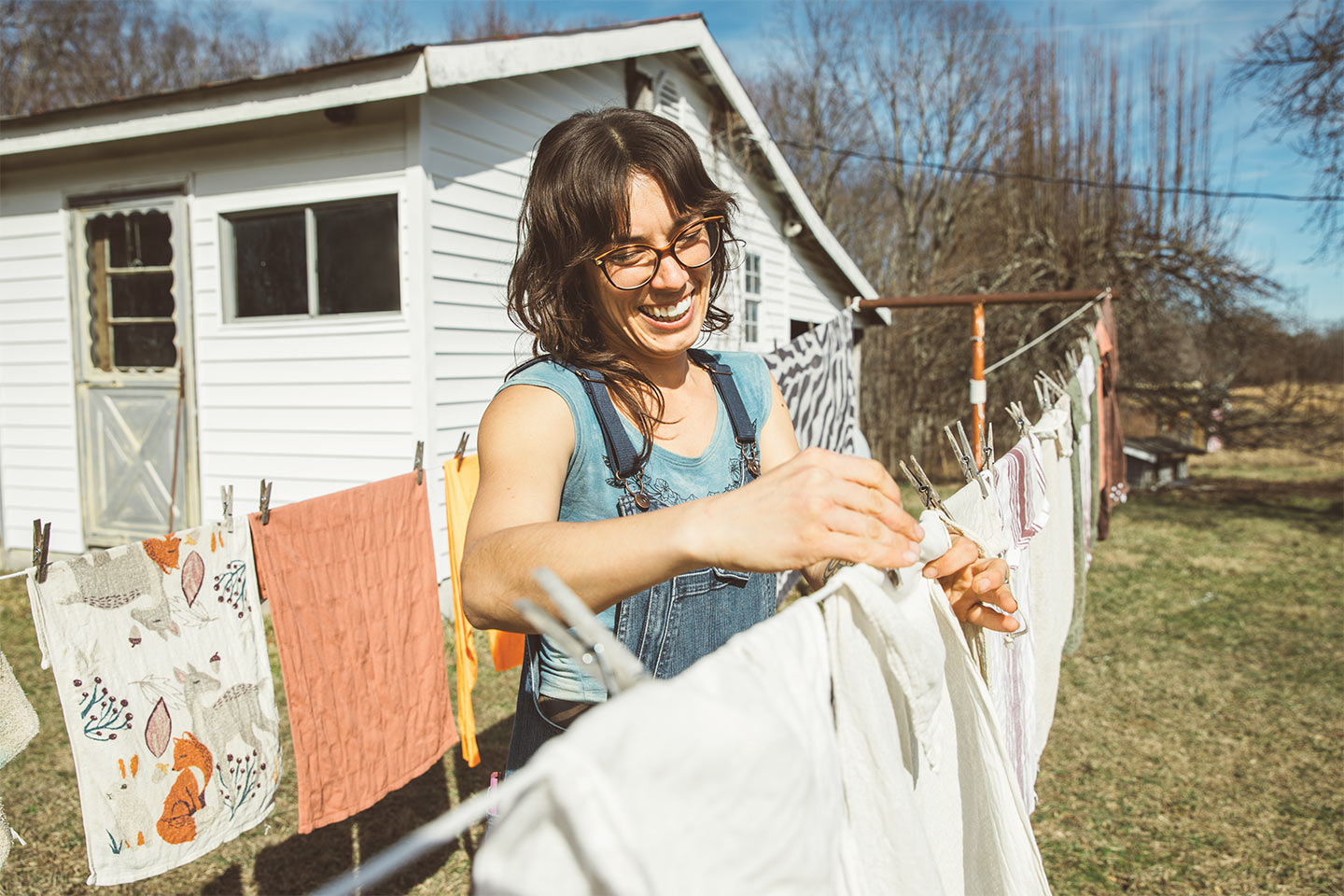
Alysia Leon | Bird Fork Farm
Before starting a farm, Alysia Leon worked as an archaeologist in Latin America and the United States. She became fascinated with permaculture and eating locally during that time, and in 2020, she started Bird Fork Farm (BFF) to become as self-sufficient as possible. “Bird Fork Farm received its name in tribute to the spring-fed creek that runs throughout a majority of the land,” says Leon. “When a friend crafted the slogan, ‘Bird Fork Farm, where the land is our BFF!’, it was set in stone.”
BFF consists of 55 acres, with about 25% of the land dedicated to farmland. Offerings at the farm include small batch herbal products, honey, and ethically foraged or naturally grown produce. While there may be no livestock on the farm, Leon shares that BFF has its fair share of surprises. “Other than bees, there is no livestock out here,” she says, “but one morning I woke up with the sunrise, went outside to say hello to the garden, and there were two large cows right in my backyard!”
In operation for three and a half years now, Leon explains that homesteading challenges have helped her grow a deeper connection with the land. “There is always a to-do list, and there will always be one in this sort of life,” she shares. “Accepting that makes everything smoother.” To avoid overworking herself, Leon has learned to let nature take the lead. Seasons change and plant cycles run their course. There are times for work and times for rest. Life at BFF has taught Leon that balance is essential.
When she isn’t working in the garden, Leon can be found beekeeping, lacto-fermenting produce, making homemade vinegars, or formulating herbal remedies and body care products. Leon invites the community to join BFF’s work through herbal workshops, homesteading-focused workshops, volunteer days, and a variety of on-farm community events. She also sells produce and products at various local farmer’s markets.
Through her work and life at BFF, Leon hopes others will join her in caring for the earth and people. Her advice to aspiring homesteaders is to start right now, right where you are. “Focus on building community while building a connection with the land you’re on,” she says. “Go slow. Observe what is around you. Everything out there – the plants, the water, the soil, the bugs – is one big happy family.”
_____
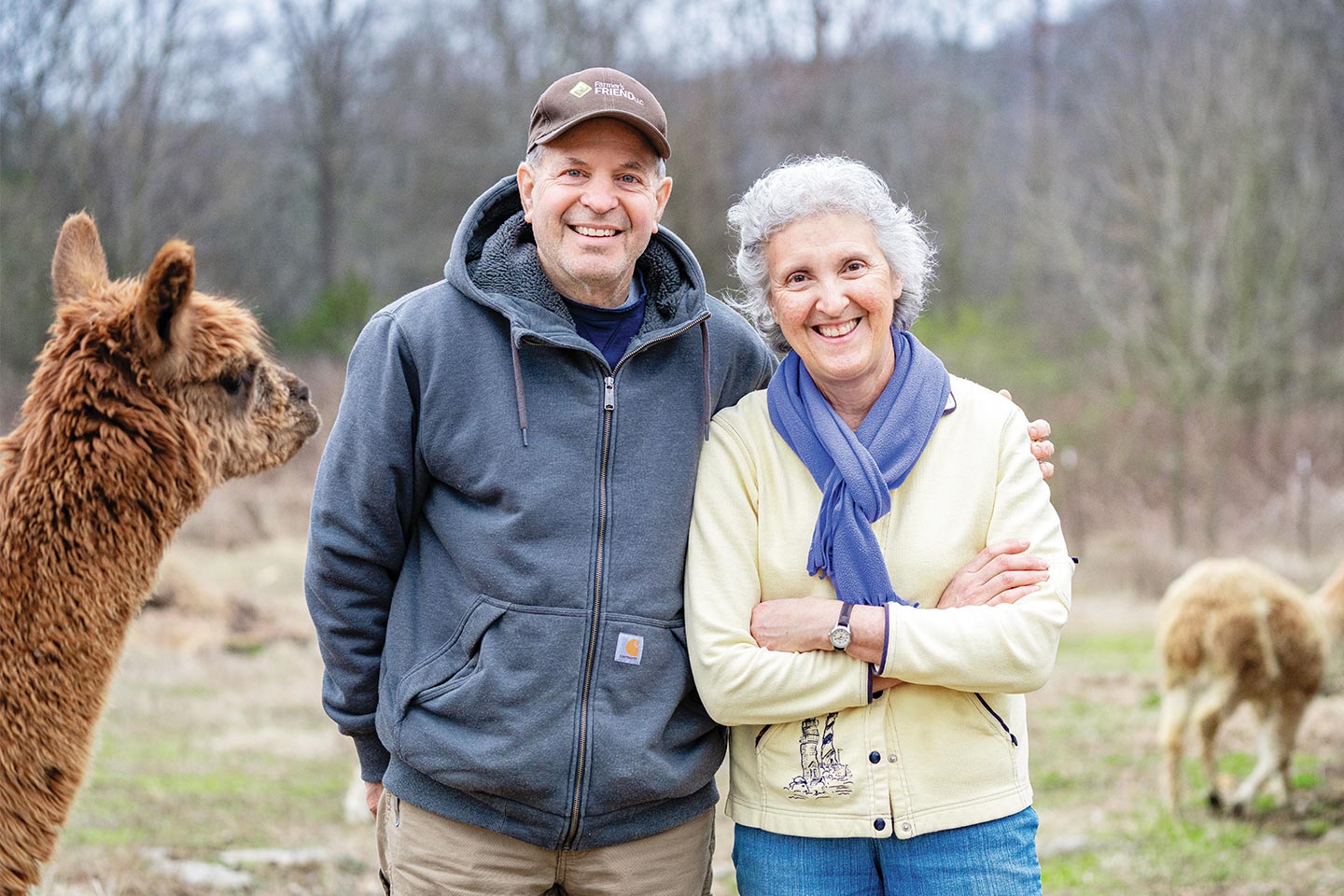
Cynthia Shaffer | Red Clay Farm
In 2008, Cynthia Shaffer and her husband Ron left the city to pursue country life. Now, after 16 years of farming, the couple live on and operate Red Clay Farm, a 53-acre property in Cleveland, Tennessee. “Being on the farm has allowed us to become more sustainable,” Shaffer says. “It is not always the romantic fantasy you may envision, but the reward is having a place where we can enjoy God’s creation through our work.”
With about 24 acres dedicated to farmland, Red Clay Farm is full of plant and animal life. Alpacas and sheep enjoy each other’s company in open fields, and once a year the animals are sheared for their fleece and wool fibers. Horses, goats, chickens, dogs, and cats also enjoy life on the farm. The gardens grow certified organic produce and beautiful flowers, and the farm is home to an indoor garden specialized for growing micro-greens and a grain mill. Ensuring fresh stoneground milled grains every time, the mill’s offerings include all-purpose flour, pastry flour, corn meal, corn grits, rye flour, pumpernickel flour, oat flour, and more.
To keep the homestead running efficiently, the Shaffers stay busy – sometimes working 24-hour days. Their daily chores include feeding and watering the animals, collecting eggs, garden maintenance, milling grains, packaging products, and baking a variety of breads and baked goods. In addition to planting wildflowers, sunflowers, and sorghum, the Shaffers’ son Seth designs the crop layout for each season. Challenges on the farm, such as unexpected weather or repair needs, keep them hard at work. On Shearing Day, the farm is especially busy. The all-day event requires a professional shearer, and the community is invited to visit the farm to view the shearing process and purchase raw fiber, roving, and yarn.
When they aren’t working on the farm, the Shaffers have a passion for connecting with their surrounding community. At local farmer’s markets, they enjoy meeting customers and educating them about seasonal produce. They deliver an organic CSA program in the warmer months, and year-round, their Community Supported Bakery (CSB) program offers fresh, healthy breads for pick up each week.
Life at Red Clay Farm is about working hard and appreciating the beauty of the natural world. While the homesteading lifestyle might not be for everyone, Shaffer advises aspiring homesteaders to ask questions, find educational resources, and stay focused on their goals. “Do your research, and make sure you are up for hard work,” she says. “It’s worth it!”
_____
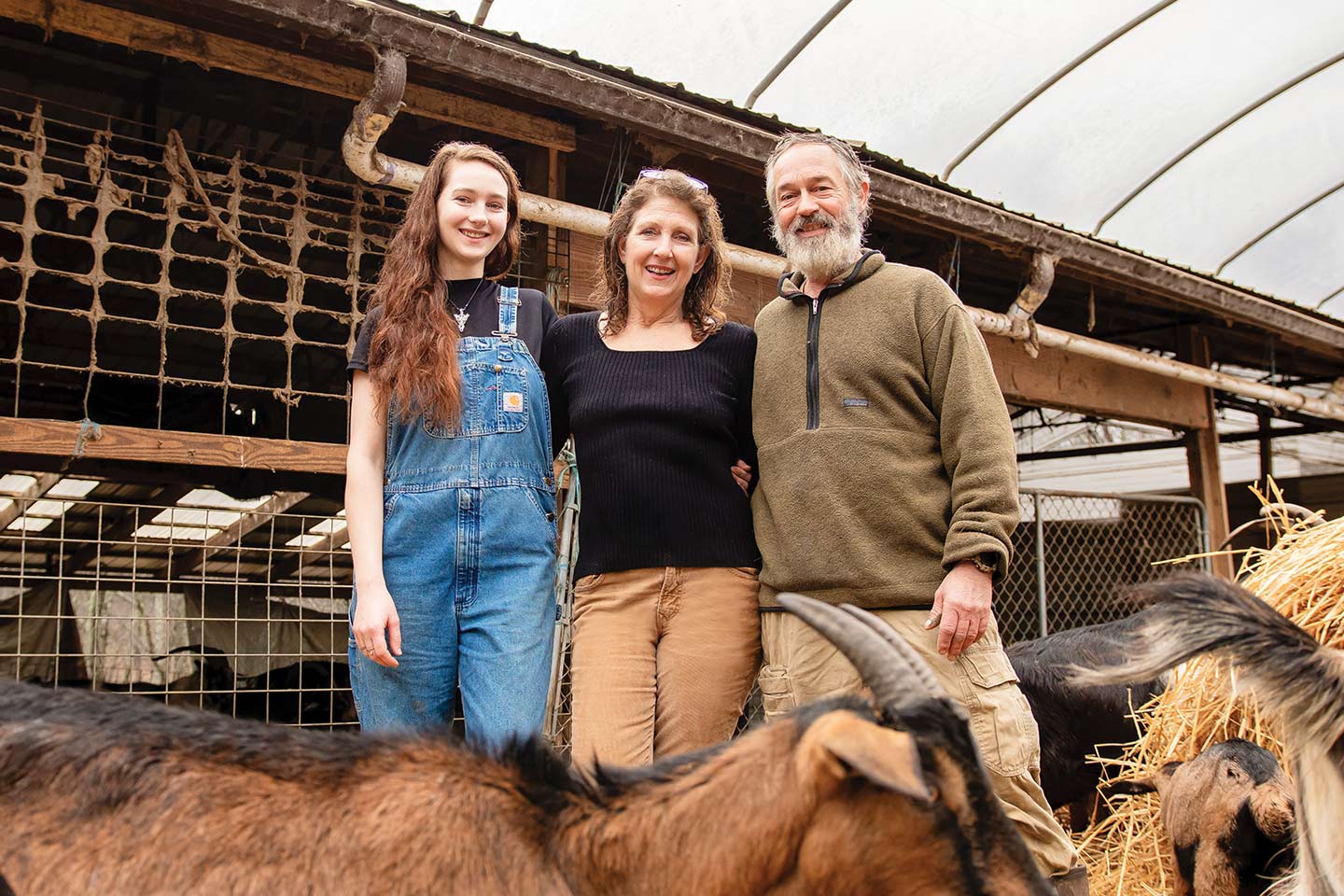
Dana Bleasdale | Fall Creek Farms
For Dana and Brad Bleasdale, life on the homestead turned into everything they dreamed it could be when they learned to do less. The couple started Fall Creek Farms in 2002 when it was only a rugged patch of wilderness, and over the years, the land evolved into a thriving farm. “After 20 years of keeping up a grueling pace on the farm, we realized we were running our lives with the same corporate pace we originally wanted to escape,” Dana Bleasdale shares. “In the last few years, we’ve learned to let go of anything that gets in the way of living a simple, peaceful, sustainable life – our original dream!”
Today, life at Fall Creek Farms is about building family and community relationships. The Bleasdales grow a variety of fruits and vegetables and have a herd of over 200 goats. Dana Bleasdale shares that the key to the homesteading lifestyle is to lean into the community. “Our excess milk goes to a pig farmer down the road who gives us pork at slaughter time,” she says. “I don’t like to can, so our extra okra goes to a friend who loves to, and she returns it to us as pickled okra!” With a variety of skills and interests, family and friends help Fall Creek Farms thrive.
Even with plenty of help from family and friends, there is never a shortage of farm chores to go around. Feeding and watering the animals, milking goats, making dairy products, and working in the garden are all essential parts of the work. While the Bleasdales’ youngest daughter lives and works on the farm with her husband, their oldest daughter and her family runs Fall Creek Farms’ sister farm, Orchard House Creamery. Together, the family is able to care for the land and enjoy the feeling of self-sufficiency.
To further connect with the surrounding community, Fall Creek Farms operates a herdshare program and offers produce and dairy products at various local farmer’s markets. The Bleasdales are also passionate about preserving homesteading skills that could be lost to time, and they offer several educational classes for those just starting their homesteading adventure. Through their work, they hope to encourage others to slow down and enjoy the simple life that homesteading provides.
Dana Bleasdale’s advice to aspiring homesteaders is to develop real relationships within the community and avoid overworking as much as possible. “It makes all the difference for setting a sustainable pace when you have a community,” she says. “After 22 years, we are living out our original vision of farm and family!”





